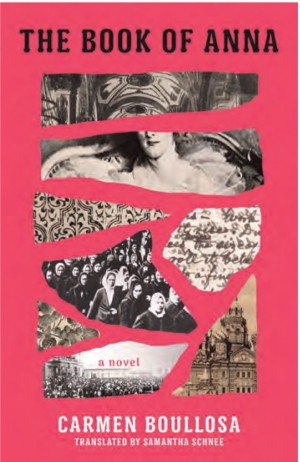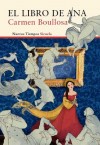
The Book of Anna (Traducción por Samantha Schnee)
QUOTES
“The latest novel from one of Mexico’s finest experimental writers is a madcap metafictive romp that picks up a few decades after Tolstoy’s Anna Karenina leaves off. But it’s also an absurdist tour de force account of early revolutionary activity. . . . Reminiscent of Bolaño, Borges, and Pynchon, but Boullosa’s utterly original voice is at its best when it’s let loose.” —Kirkus, Words Without Borders, Anticipated 2020 Titles.
“This superb translation from Spanish by Samantha Schnee, founding editor of Words Without Borders, is a book of nimble prose that deftly plays with the boundaries between fiction and history. Drawing together servants, diplomats, anarchists, seamstresses and aristocrats at the eve of the Russian Revolution, Boullosa brings heightened eroticism, feminism, and liberation to Tolstoy’s imagined world.” —Lauren LeBlanc, Observer
“[A] slim, playful sequel set in the early twentieth century that is deeply attuned to the concerns of the twenty-first. . . . Part Bluebeard’s Castle, part Cinderella, Anna’s text has a dreamlike, fairy-tale logic and is fueled by a smoldering eroticism. It reads like a feminist rebuke to her static portrait and to Tolstoy’s efforts to ‘fix’ or correct Anna on the page. . . . The Book of Anna succeeds at defamiliarizing Tolstoy’s original, re-envisioning it through an entertaining feminist lens.” —Chicago Review of Books
“[O]ffers a new twist to Anna Karenina that centers her children on the eve of the Russian Revolution. . . . Boullosa offers an original perspective on this Russian classic that may light the subversive spark lying dormant within.” —Ms. Magazine
“[P]resented in parallel with stories and characters that were not part of Tolstoy’s 1878 novel, The Book of Anna is also an imagining of the book that Anna herself was working on. . . . Boullosa tips the notion of fiction on its head. Set on the eve of the Russian Revolution, The Book of Anna is told in a rich, unique style.” —Buzzfeed
“[T]hreads characters from Leo Tolstoy’s masterpiece into an innovative narrative caper that blends history, fiction, and fairytale. . . . The sheer innovation of Boullosa’s multi-layered narrative presents the reader with a nesting doll of fictions and histories—threads that intertwine questions of self-hood, artistic creation, and the many-layered voices of political change. The Book of Anna marks the rare achievement of a writer who balances the weight of Tolstoy’s complicated genius with her own interpretation of events, real and fictitious, with unmitigated brio and a touch of mischievous whimsy. It will surely become a modern classic.” —Paperback Paris
“[An] experimental and playful novel that at once is a tribute to the book Anna Karenina, and also means to revise the portrayal of its central female character. . . . Boullosa continues to charm—though a shade darker—in a section that is written like a fairytale, ostensibly by Anna herself. It has recognizable aspects of Cinderella, but in the shadow of Tolstoy’s book, it reads like a feminist treatise full of metaphors about fate, love, and ownership. . . . An innovative delight.” —The Book Slut
“[A] slim, playful sequel set in the early twentieth century that is deeply attuned to the concerns of the twenty-first. . . . Part Bluebeard’s Castle, part Cinderella, Anna’s text has a dreamlike, fairy-tale logic and is fueled by a smoldering eroticism. It reads like a feminist rebuke to her static portrait and to Tolstoy’s efforts to ‘fix’ or correct Anna on the page. . . . The Book of Anna succeeds at defamiliarizing Tolstoy’s original, re-envisioning it through an entertaining feminist lens.”—Chicago Review of Books
“This translated tale offers a new twist to Anna Karenina that centers her children on the eve of the Russian Revolution. . . . Boullosa offers an original perspective on this Russian classic that may light the subversive spark lying dormant within.”—Ms. Magazine
REVIEWS
Three Per cent, Podcast by Chad Post.
"On the Book of Anna and Reading Tolstoy: Siri Hustvedt and Carmen Boullosa", Center For Fiction.
"A twist on Tolstoy in The book of Anna”, Kat Solomon, News Break.
"The Book of Anna: Camen Boullosa", Phillip Lopate, McNally Jackkson.
"Carmen Boullosa´s The Book of Anna ls a Masterpiece of Metafiction", Leah Rodríguez, Paperback Paris.
"Karenina´s Children", Yiyun Li, The New York Review.
"Puppets made of ink: a review of Carmen Boullosa´s The Book of Anna", Spencer Ruchti, The Androit Journal.
"The book of Anna by Carmen Boullosa", Jessica María, The book slut.
"Reminiscent of Bolaño, Borges, and Pynchon, but Boullosa´s utterly original voice is at its best when it´s let loose", by Carmen Boullosa, translated by Samantha Schnee, Kirkus Reviews.
"21 great Books From Small Presses to read now", Wendy J. Fox, Buzz Feed News.
"April 2020 Reads for the rest of Us", Karla Strand, More than a Magazine.
"New Book Releases", Angela Lashbook.
"On The book of Anna and reading Tolstoy: Siri Hustvedt and Carmen Boullosa", The Center for Fiction.
"Carnal Language: An Interview with Carmen Boullosa", Samantha Schnee, Southwest Review.14.
"How writers write", Online Reading Series.
"From Mexico, tales of a Russian socialite and a small-town witch", Jorge Valencia, The world.
"Review Boullosa´s Book", Samanta Schweblin, World Literature Today.
Specifications
- Language: Inglés
- Año de publicación:: 2020
- No. de páginas: 200
- Comprar ahora:





